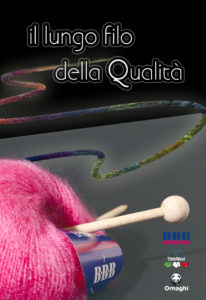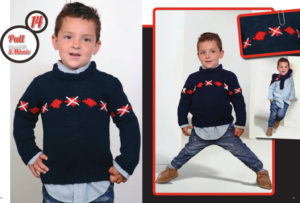
Some Italian brands established in the 20th century caught the eye from the very start. “BBB lane” is one of them. Already in the 50’s, they were aware of the importance of advertising campaigns and had placed their image in the capable hands of a master of Italian graphics, such as Federico Seneca (the inventor of Bacio Perugina as it is branded nowadays, so to speak).
In that same view, the BBB filati range – which since 1997 belongs to the Ballabene family and to Titan Wool, a family business based in Riccione, – continues to stand out on the market with quality materials and initiative. The owner, Mr. Eliseo Ballabene, explains it talking about manufacture and markets, looking from Italy to the rest of the world and even to bookstalls thanks to a cooperation with the publisher De Agostini.
The Company

«I have worked in this field for over forty years», he recalls. «I started as a sales representative, then, in the mid ‘70’s I established two companies with some other associates. From the early ‘90s, with Titan Wool, I went ahead alone and, in 1997, I acquired the BBB filati trademark. Both the trading and the manufacturing business are located in Riccione with approximately 24 employees in the factory and in the office. Subcontractors do the rest of the job, while about fifteen sales representatives sell in Italy and a few professionals take care of the international market. We manufacture high quality yarns, like 100% cashmere, 70% superkid 30% silk and 70% merino wool with 30% silk; unshrinkable 100% merino wool; classic mixed yarns; fancy wool; 100% acrylic and pure cotton. Just to give you an idea, our gross turnover of finished product, in wool and cotton balls, averages approximately 500 thousand kilograms per year. We sell most balls with our trademark, except in Finland and Sweden, where we reached an agreement to sell with local labels. We outsource both spinning and dyeing operations, and we carry out the final steps of unbatching and ball winding on four large proprietary machines. As I said, the remaining steps are commissioned to subcontractors, a handful of businesses with which we have worked for a long time. They are all Italian companies, 80% of which based in the Biella area, cradle of this industry, with the remaining 20% based in the Parma area».
Manufacturing Stages
«We do not shear sheep, however, we manufacture the yarn», he points out stepping through the stages of the manufacturing cycle of Titan Wool items. «Usually raw materials (entirely from abroad, as wool fibres from local sheep are too short to be used in this process) come from three import companies that actually work as a representative office. Options, also called contracts, classed on the type of materials, last for a certain time until you reach a stated weight (e.g. 10 thousand kilograms we can collect within 6 months). Then, you call for tops (approximately 500 kg bales) to be cleared through customs. Just to give an example, we buy mohair wool from South Africa. Then tops go to a dyeing mill or to a spinning mill, according to our requirements. We work with three reliable dyeing-mills: two of them do the same job on hanks and cones; the third one can dye tops before the spinning process. Three other companies do the spinning: one for thin wool yarns, one for medium wool yarns, one for coarse/thick wool yarns. Every year, in January, we present a new set of samples including approximately 40 basic items and 20 new ones that change every year. We process these new items on our own as well as in association with a couple of specialists who study and make available customized fancy yarns expressly for ourselves and for other manufacturers as well. There is a lot of research on materials and shades involved in the process and we make use of quality machines that can achieve special workings, rather expensive for enterprises like ours».

The Market
«Thanks to a good quality/price ratio, much of our product goes abroad – he adds. Not yet 50% of it, however, because of the recent slump on the domestic market, the gap is no longer so big. In our country, a network of sales representatives and district sales managers covers the market, from door-to-door salespersons to shops, from larger knitting mills to units making dog clothing and apparel. Again, for Expo 2015 we supplied about 3 tons of wool to line the Macedonia pavilion. I do the export with our sales department staff and with some agents abroad, we exhibit in Cologne and at Pitti Filati as well. We do a very good job in the Russian area, as well as with all Eastern European countries. The same is for Switzerland, Spain, France and Germany. As I mentioned, we manufacture for the Finnish and Swedish market with customers’ label. We are developing the business in South East Asia: Taiwan is a good market, with Hong Kong, Bangkok; we are also doing some business in Japan. We have not yet touched the Chinese and Indian markets. Last, but certainly not least, the distribution at bookstalls is a very good opportunity. In the past, with Hachette Partworks, both in Italy and on the international market, at present with De Agostini Partworks, with which we reached an agreement: their knitting magazines include items from our range. Moreover, this happens not only in Italy, but also in Spain and Poland. Talking about publishing projects, until recently, we used to publish our own knitting magazine Gomitoli&co (Balls & co.) offering suggestions and directions on needle punching; we recently decided to continue on the Web and/or at retailers’ only, offering data sheets, sketches and directions».




